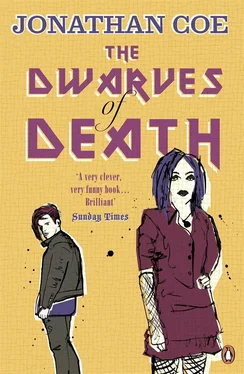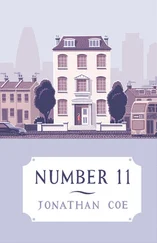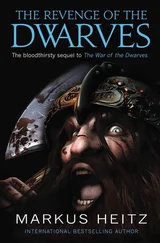Jonathan Coe - The Dwarves of Death
Здесь есть возможность читать онлайн «Jonathan Coe - The Dwarves of Death» весь текст электронной книги совершенно бесплатно (целиком полную версию без сокращений). В некоторых случаях можно слушать аудио, скачать через торрент в формате fb2 и присутствует краткое содержание. Год выпуска: 2008, Издательство: Penguin Books, Жанр: Современная проза, на английском языке. Описание произведения, (предисловие) а так же отзывы посетителей доступны на портале библиотеки ЛибКат.
- Название:The Dwarves of Death
- Автор:
- Издательство:Penguin Books
- Жанр:
- Год:2008
- ISBN:нет данных
- Рейтинг книги:4 / 5. Голосов: 1
-
Избранное:Добавить в избранное
- Отзывы:
-
Ваша оценка:
- 80
- 1
- 2
- 3
- 4
- 5
The Dwarves of Death: краткое содержание, описание и аннотация
Предлагаем к чтению аннотацию, описание, краткое содержание или предисловие (зависит от того, что написал сам автор книги «The Dwarves of Death»). Если вы не нашли необходимую информацию о книге — напишите в комментариях, мы постараемся отыскать её.
The Dwarves of Death — читать онлайн бесплатно полную книгу (весь текст) целиком
Ниже представлен текст книги, разбитый по страницам. Система сохранения места последней прочитанной страницы, позволяет с удобством читать онлайн бесплатно книгу «The Dwarves of Death», без необходимости каждый раз заново искать на чём Вы остановились. Поставьте закладку, и сможете в любой момент перейти на страницу, на которой закончили чтение.
Интервал:
Закладка:
‘Sorry.’
He gave her the extra money and I stood there, feeling more stupid than I’d felt in a long while.
‘Do you have to stand at the bar?’ she said. ‘It makes it hard to serve the other customers.’
There was a small table free in the corner, so I went and sat down. If I hadn’t arranged to meet Harry, I would have run out of the pub there and then. But it wasn’t just that I had made a fool of myself in front of Karla: that was bad enough, but what really shocked me was the light it threw on my behaviour yesterday. Was my commitment to Madeline really that feeble? Was I really so lazy about putting any work into that relationship? We had had one little argument — our first genuine argument for months — and instead of following her and attempting to resolve the issue I had gone off on my own, full of self-pity, got drunk, behaved like an idiot in Samson’s, and then gone to eavesdrop outside the flat of another woman, someone I had barely met but for whom I had felt, the last time I saw her, a vague physical attraction. It was pathetic. No wonder Madeline had been angry with me. Somehow or other, I was going to have to get back in touch with her and make a big effort: some gesture — a present, perhaps — flamboyant but sincere, which would convince Madeline once and for all that I was in earnest about her.
I put this proposition to Harry, after he had arrived and I had shown him the record (which gave him considerable satisfaction).
‘What was this argument about, exactly?’ he asked. He seemed a bit nervous talking about it, because affairs of the heart weren’t his strong point, and besides (as I think I mentioned) I had never spoken to him about Madeline before.
‘Well, I don’t really know. That’s the problem. She was late arriving, and we quarrelled about that a bit. Then things got even worse and I asked her if something was the matter and she said she wanted… a change.’
‘What sort of change?’
‘A change in the relationship.’
Harry frowned.
‘What sort of change in the relationship?’
‘I don’t know, do I? If I knew that, then I wouldn’t be asking you about it.’
I sipped my Becks angrily while Harry sat there looking sheepish. Finally he said: ‘Perhaps she wants you to get married.’
I looked at him in astonishment.
‘What?’
‘Perhaps that’s what she meant, when she said she wanted a change. Perhaps she meant… marriage.’
I considered this for a moment.
‘Are you serious?’
‘It’s just a thought. I don’t know much about these things.’
After a pause, I said, ‘She would have said so, wouldn’t she, if that’s what she meant?’
Harry shrugged. ‘I don’t know. Women are funny about things like that.’
I shook my head. ‘No, it’s ridiculous. She must have meant something else.’
‘Like what?’
‘Well…’ No alternative suggested itself to me. ‘But that’s crazy — I mean, I’m not in a position to marry her.’
‘True. But that’s not to stop you asking. She might just want that feeling of, you know, security.’
I was still trying to come to terms with this suggestion when I heard Karla’s peremptory voice behind me.
‘Excuse me, would you?’
She wanted to wipe our table down, and the record was in the way. I removed it, she gave the table a quick, careless wipe with a damp cloth, and left without saying anything else. A distinct chill remained after she’d gone.
‘I thought you were quite friendly with her,’ said Harry.
‘Oh, she’s just busy tonight, that’s all.’
I lapsed into silence again, and when Harry next spoke, his tone was gloomy.
‘I’ve been listening to the tape we made on Tuesday.’
‘And?’
He shook his head meaningfully.
‘As bad as that?’
‘I think we’d be wasting time and money if we tried to send it off to anybody.’
I sighed. ‘I knew we should have done a different song.’
I was just fishing for a compliment here, and he duly took the bait.
‘It’s not the song. It’s a great song. But the whole thing doesn’t gel: it sounds a mess. Perhaps we didn’t have enough time to rehearse it.’ Looking forlornly into the middle distance, he said, ‘Shit. I really did want this one to work, too.’ He drained off the last of his beer. ‘We’re in a mess, Bill, we really are.’
*
I was in a mess, too. For the second night in a row, I was drunk. Even though Harry had been with me this time, it was a joyless experience. When I got back to the flat, shortly after midnight, I could hardly fit my key into the lock, and I was conscious of making an enormous amount of noise as I clattered around and started to run the bath. There was no sound from Tina’s room, and her door was firmly closed. Perhaps she’d gone to work after all. I pushed the door open and looked in: after a few seconds, I could make out her sleeping body. She was breathing deeply and lying on her side. Everything seemed all right.
They’re good things, baths. You can get a lot done in a bath, in my experience. Thinking, I mean. It was while I was in the bath that night that I had my brainwave, and the two problems I had been discussing with Harry — the problem with Madeline, and the problem with our tape — suddenly cohered: it seemed a sort of natural miracle, as when two elements react together to form a completely new compound.
It wasn’t by means of a conscious thought-process, either. I was singing the tune to myself in the bath, the tune of ‘Stranger in a Foreign Land’: only where I should have been singing the words ‘Now and then’, at the beginning of the verse, I was singing ‘Madeline’ instead. It seemed to fit perfectly. And all at once I thought — well, it would only take a few more changes, and the whole song could be about her. Better still, it could be for her. And what about that line — ‘When I’m down, will you carry me?’ There was something else, surely, that was crying out to be sung there: ‘Madeline — will you marry me?’
A marriage proposal in the form of a song. Words and music entirely by myself. If Harry was right, and this was what Madeline had really been trying to tell me that evening, how could she possibly resist such a novel approach? What better way, not only to bring about a reconciliation, but to put everything on an entirely new footing? It had been music which had brought us together in the first place, so it was only right that it should be music — my music — which should heal this temporary rift and ensure that nothing like it would ever happen again.
Five minutes later, still wet from the bath, I was telephoning Harry.
‘Bill, it’s nearly one o’clock,’ he said, in a voice heavy with sleep. ‘This had better be important.’
‘I’ve been thinking,’ I said. ‘It’s not too late to do something about that song. I’m going to write some new words and we can record the whole thing again.’ There was silence from his end. ‘Well?’
‘I can’t see Martin and Jake jumping at that idea, to be honest.’
‘Never mind about them, we could do it ourselves — just you and me. Look, I can come over tomorrow and we can write a drum pattern together on your machine. Then we can take it into the studio on Sunday and get it all done in less than four hours. I’m sure of it.’
‘What about the guitar part?’
‘You can do that. Let’s face it, Harry, you’re better than Martin anyway.’
He went silent again, and I could tell that he was coming round to the idea.
‘New words, you say?’
‘Yes. New words. Don’t worry about those. Leave those to me.’
*
It was now early December, 1988: a time of bleak and perfunctory afternoons and long dark evenings. Winter is a bad time to be in London, even a mild winter like this one. Some people manage to make themselves comfortable: I could imagine, for instance, that for Mrs Gordon, tucked up between linen sheets in her Kensington mansion, with Madeline always on call to bring her tea and buttered toast at the touch of a bell, the passing of the seasons might have made very little difference. It was easy to forget, at times, that such people existed and that such lives were lived. I had little to complain about, myself. I had a roof over my head and a cheap one at that; a couple of miles away, men and women were sleeping in cardboard boxes under Waterloo bridge. So it wasn’t a sense of material hardship which made me shiver and ache for better things, as I battled against the wind on my way to the studio through the grounds of Guy’s Hospital (the coldest and windiest place in London). It was four o’clock on a Sunday afternoon, the world was getting dark, and I tried to promise myself that there would not be many more afternoons like this, afternoons when I would stagger along with my keyboard under my arm from one hopeless engagement to another, the ambition which was meant to be driving me on nothing but a memory, lodged in my brain like a dead weight. All that would change. Not that I thought the tape we were about to make would ever impress a record company (even if it got as far as one): I had more or less given up on The Alaska Factory. But I was confident of the impression it would make on Madeline; and confident, too, that if I had before me the prospect of marrying her, I would feel a new sense of responsibility which might force me to think harder and more intelligently about my career.
Читать дальшеИнтервал:
Закладка:
Похожие книги на «The Dwarves of Death»
Представляем Вашему вниманию похожие книги на «The Dwarves of Death» списком для выбора. Мы отобрали схожую по названию и смыслу литературу в надежде предоставить читателям больше вариантов отыскать новые, интересные, ещё непрочитанные произведения.
Обсуждение, отзывы о книге «The Dwarves of Death» и просто собственные мнения читателей. Оставьте ваши комментарии, напишите, что Вы думаете о произведении, его смысле или главных героях. Укажите что конкретно понравилось, а что нет, и почему Вы так считаете.












